 | TODAY IN SCIENCE HISTORY NEWSLETTER - 24 FEBRUARY |
| Feature for Today |
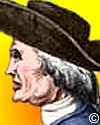 On 24 Feb 1810, Henry Cavendish died. In a talk given in 1875, Sir Thomas Edward Thorpe said, "Earth, air, fire, and water—each and all came within the range of his observations." On 24 Feb 1810, Henry Cavendish died. In a talk given in 1875, Sir Thomas Edward Thorpe said, "Earth, air, fire, and water—each and all came within the range of his observations."Thorpe described Cavendish in the context of his era - then merely 90 years before - and embroiders his life with some of the imagery of a novelist providing a setting to provide your imagination a picture of the character. Cavendish is for you perhaps only a vague name. By reading Thorpe's talk on Henry Cavendish, you may find you have a better background about one more scientist than you really knew about before." |
| Book of the Day | |
| |
| QUIZ | |
| Before you look at today's web page, see if you can answer some of these questions about the events that happened on this day. Some of the names are very familiar. Others will likely stump you. Tickle your curiosity with these questions, then check your answers on today's web page. | |
| Births | |
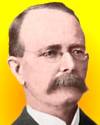 |  John Philip Holland, born 24 Feb 1840, was an Irish inventor who designed and built the first vessel of its type accepted and purchased by the U.S. Navy. John Philip Holland, born 24 Feb 1840, was an Irish inventor who designed and built the first vessel of its type accepted and purchased by the U.S. Navy. What new Navy vessel did Holland invent? What new Navy vessel did Holland invent? |
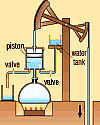 |  Thomas Newcomen, born 24 Feb 1663, was an English inventor of the atmospheric steam engine. It had a piston connected to one end of a large crossbeam; the other end was connected to a very heavy pump piston. On each stroke, water chilled and condensed the steam in the cylinder, dropping the piston thus moving the crossbeam and operating the pump. Thomas Newcomen, born 24 Feb 1663, was an English inventor of the atmospheric steam engine. It had a piston connected to one end of a large crossbeam; the other end was connected to a very heavy pump piston. On each stroke, water chilled and condensed the steam in the cylinder, dropping the piston thus moving the crossbeam and operating the pump. |
| Deaths | |
| |  An English physicist and chemist (1731-1810) researching in his own private laboratory identified hydrogen as a separate gas, studied carbon dioxide, and determined their densities relative to atmospheric air. He also established that water was a compound. A Laboratory at Cambridge, England, was named after him. An English physicist and chemist (1731-1810) researching in his own private laboratory identified hydrogen as a separate gas, studied carbon dioxide, and determined their densities relative to atmospheric air. He also established that water was a compound. A Laboratory at Cambridge, England, was named after him.  Can you name this scientist? Can you name this scientist? |
| Events | |
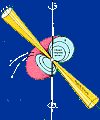 |  On 24 Feb of a certain year, Nature carried the announcement of the discovery of pulsars (pulsating radio sources). The first pulsar was discovered by a graduate student, Jocelyn Bell, who was working under the direction of Prof. A. Hewish. They were using a special radio telescope, a large array of 2,048 aerials covering an area of 4.4 acres. On 24 Feb of a certain year, Nature carried the announcement of the discovery of pulsars (pulsating radio sources). The first pulsar was discovered by a graduate student, Jocelyn Bell, who was working under the direction of Prof. A. Hewish. They were using a special radio telescope, a large array of 2,048 aerials covering an area of 4.4 acres.  In which decade was this first discovery of a pulsar made and announced? In which decade was this first discovery of a pulsar made and announced? |
 On 24 Feb 1925, an ice jam was removed using a thermit for the first time in the U.S. It was a 250,000-ton ice jam that had clogged the St. Lawrence River near Waddington, NY. and was broken up a few hours after the reaction of three thermit charges of 90-lb each. Thermit is a mixture of finely divided magnesium and the oxide of another metal. When properly ignited, a vigorous reaction produces hot molten metal. The method was first applied by Howard Turner Barnes, Professor of Physics at McGill University, Montreal, Canada. On 24 Feb 1925, an ice jam was removed using a thermit for the first time in the U.S. It was a 250,000-ton ice jam that had clogged the St. Lawrence River near Waddington, NY. and was broken up a few hours after the reaction of three thermit charges of 90-lb each. Thermit is a mixture of finely divided magnesium and the oxide of another metal. When properly ignited, a vigorous reaction produces hot molten metal. The method was first applied by Howard Turner Barnes, Professor of Physics at McGill University, Montreal, Canada.  What is the oxide used in the thermit mixture? What is the oxide used in the thermit mixture? | |
| Answers |
When you have your answers ready to all the questions above, you'll find all the information to check them, and more, on the February 24 web page of Today in Science History. Or, try this link first for just the brief answers. Fast answers for the previous newsletter for February 23: computer axial tomography; vitamine = life amine, changed to vitamin when it was discovered that not all the vital diet factors were amines; bakelite; the decade including the year 1886; polio |
| Feedback |
 If you enjoy this newsletter, the website, or wish to offer encouragement or ideas, please send feedback by using your mail reader Reply button. If you enjoy this newsletter, the website, or wish to offer encouragement or ideas, please send feedback by using your mail reader Reply button. |
--
If you do not want to receive any more newsletters, Unsubscribe
To update your preferences and to unsubscribe visit this link

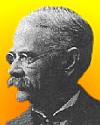
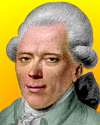

Δεν υπάρχουν σχόλια:
Δημοσίευση σχολίου